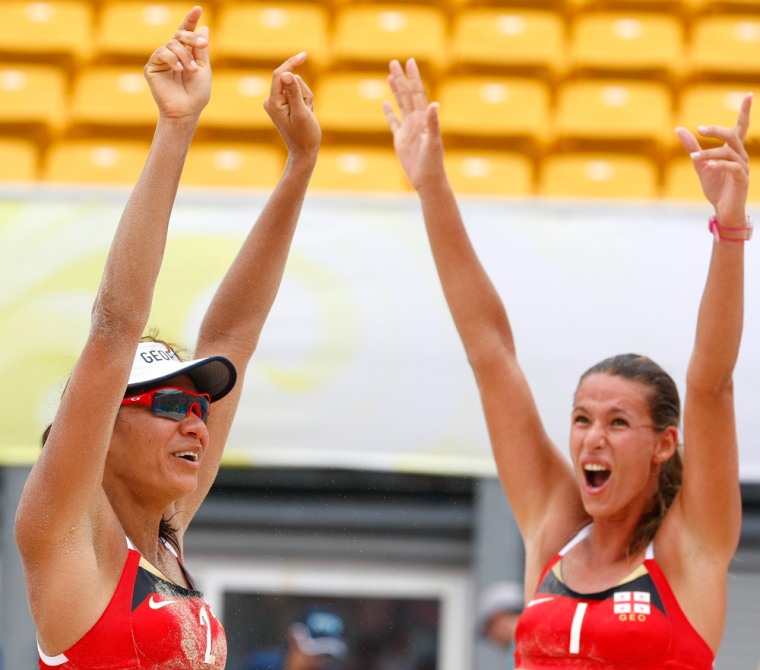The five-day battle between Russia and Georgia killed hundreds, if not thousands, left 100,000 without homes and turned an obscure pair of Brazilians in the Olympics’ biggest beach party into proxies for a war-torn people they barely know.
With the border war casting sobriety upon an otherwise spring-break style of sport, Cristine Santanna and Andrezza Chagas rallied from a first-set blowout to beat Russia in beach volleyball Wednesday. The native Brazilians, who shopped for new citizenship to circumvent a quota of two teams per country, preserved their chance at an Olympic medal and offered their adopted homeland hope for even more.
“We had to give extra for the Georgian people,” said Santanna, who made just two short trips to Georgia to apply for a passport. “I give my strength to them. I fight here as they fight there.”
“Today,” she said, in an odd but moving mixture of President Kennedy at the Berlin Wall and Lou Gehrig at his Yankee Stadium farewell, “I feel like I am a Georgian.”
In a game broadcast on Georgian television and monitored at the Chaoyang Park venue by enough reporters for a gold medal match, Santanna and Chagas beat Alexandra Shiryaeva and Natalya Uryadova 10-21, 22-20, 15-12.
In other Olympic action, Georgia's Manuchar Kvirkelia won gold with a victory over China's Chang Yongxiang in the Greco-Roman 74-kilogram weight class and Irakli Tsirekidze took gold in the men's 90kg judo final.
Santanna said she slept poorly the night before, thinking about what the match meant not only to her but to the people in Georgia who sent messages of encouragement.
“I knew it was an important game to get out of the bracket, and I knew it was an important game for the Georgian people,” she said. “I think they are very proud of us.”
Georgian volleyball federation President Levan Akhvlediani confirmed it.
“It’s very important for the Georgian people to make a small happiness,” he said. “My answer is simple: Let’s fight on the fields, not outside of them.”
Dozens of reporters scurried around a media center that had previously been sleepy, as the beach volleyball competition moved sluggishly through the round-robin. Most were interested in little but whether the crisis in the South Ossetia region was on the players’ minds.
“We just want to end the conflict,” Shiryaeva said. “All the history between us was friendly.”
But as the post-match news conference came to a close, Uryadova snapped.
“If they were Georgian, that certainly would have been an influence,” she said, her arms folded at her waist. “But they are not.”
Santanna responded with grace.
“We had a good match,” she said. “I want to congratulate them and I do not want there to be a war between us.”
Shiryaeva explained that her partner was feeling the pressure of losing and falling to 0-3 in the Olympics. Despite taking each opponent to three sets, and losing those by a total of eight points, their games are over.
The competition for the two Olympic berths allowed for each country is fierce in talent-rich Brazil, which if not for the country quota could have as many as seven entries in the 24-team women’s field. The Georgian men are also Brazilians by birth; just a handful of reporters were still there when they beat Angola in their round-robin finale.
The men, Renato Gomes and Jorge Terceiro, put the nicknames “Geor” and “Gia” on their uniforms. Santanna and Martins went for Saka and Rtvelo — “Georgia,” in Georgian — out of affection for in the country emblazoned on their uniforms, their visors, their equipment bags.
When Russian bombs began dropping and the Georgian athletes gathered in the Olympic village to return home, they were prepared to leave as well.
“I could be, like, ’Why should I go home? I’m from Brazil.’ But I thought, ’Let’s go,”’ said Santanna who played college volleyball at Louisiana Tech. “I wanted to support them because they have families there. “
There were few supporters from either country in the stands, where fans waved Olympic and Chinese flags but little to hint at the strife in South Ossetia. Georgia had the advantage of the Brazilians in the crowd, some of whom wore green or yellow fright wigs and shouted “Georgia! Jia Yuo!” (Georgia! Go!)
Nearby, one family hung a large Russian flag from the railing.
“I am not thinking about the war,” said Andrey Sviridov, a native of Omsk in Western Siberia who lives in Beijing teaching English. “The war is between the politicians, not between the people. This spectacle is for the people.”
